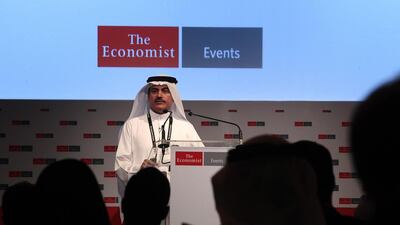DUBAI // The UAE is the only country in the region that is fast-tracking new drugs so that patients who are in need can get access to the most effective medicines quickly.
While most countries take between two and four years to register new drugs, the UAE is able to do so within two or three months.
Dr Amin Al Amiri, assistant undersecretary for public health policy and licensing at the Ministry of Health, discussed fast-tracking at the Health Care in the Middle East and North Africa Conference at Madinat Jumeirah on Tuesday. He also said that the ministry was considering making health insurance federal.
“We have an accelerated system for drug registration and these are not just generic drugs, but innovative medicines that are approved by the food and drug administration in the United States or the European medicines agency,” said Dr Al Amiri.
“We allow fast access to medicines to the patients who need them.”
Drugs are called innovators when it is the first time a particular combination is used. Trulicity, a diabetes innovator medication, was approved in the UAE in November last year, making the country the second in the world to register the drug.
Exviera and Viekirax, which treat hepatitis C, were approved last year and, again, the UAE was the second in the world to do so. Innovator drugs for lung cancer, multiple sclerosis, melanoma and leukaemia have been registered in the UAE last year and this year.
Dr Al Amiri said that the increase in the number of diseases, obesity, hypertension and changes in lifestyle in this country meant that the demands on the health sector were changing and growing day by day.
“It has been estimated by the World Health Organisation that one out of 10 people in Mena has diabetes. By 2035, 68 million people will have diabetes and every country will have new systems to cope with lifestyle changes,” he said, while discussing the importance of innovation in health care. Innovation, he said, was the leading tool to help people reach the new drugs that would help them.
Dr Sameen Siddiqi, director of the department of health systems development at WHO’s eastern Mediterranean regional office, said the fast-tracking of drugs was safe because these medicines were registered and approved by national authorities in other countries, and with good evidence.
“The purpose of fast-tracking medicines is to facilitate and not risk the lives of people.
“Ministries have to partner with academia and the private sector and there are many chances for innovation,” Dr Siddiqi said.
Dr Al Amiri also announced that health insurance across the Emirates could be made federal, meaning that insured people, if they cannot already, could use their health cards across the country and not just in specific emirates, although no details were available yet.
“Soon it will be federal. The Ministry of Heath is working on it and the concerned sector will be announcing,” he said.
Dr Al Amiri also pointed out that entrepreneurs in the region were being encouraged to enter the medical sector in the UAE, because GCC nationals could now own hospitals in the country. Previously they had to partner with Emiratis.
A recent decree from Sheikh Mohammed bin Rashid stated that GCC nationals with experience in medicine and pharmaceutical industries could now independently own hospitals or medical centres or pharmaceutical factories in non-free zones.
Dr Vivek Muthu, chief health adviser at analysts Economist Intelligence Unit, said the quality of service provided was more important to the customer than knowing who owned the facility.
“It’s a good regional development. To manage and run a business, especially in health care, and be involved in the innovation that is required is good for upscaling,” he said.
arizvi2@thenational.ae


